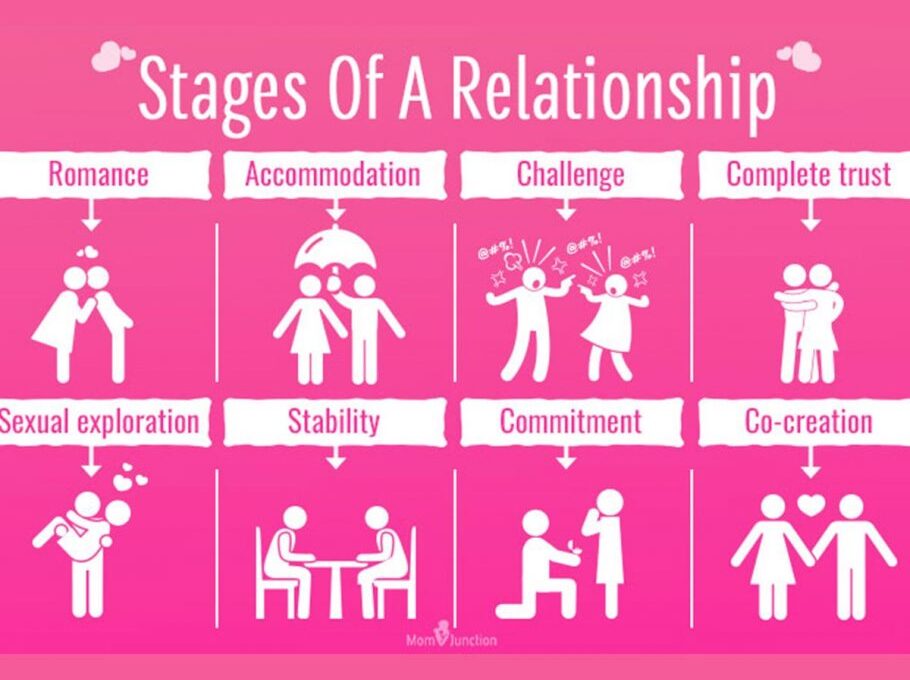
Understanding the Phases of a Relationship
Long-term relationships can be intimidating, and even between the best match, the road to love has its ups and downs. Such growing pains are reflected in a phenomenon known as “the seven stages of love.” These seven stages of relationship development are a challenging yet necessary part of any long-term romantic connection.
Being able to identify your current stage, understanding its importance in the big picture, and knowing what you must do to break through to the next level will give you the tools you need to set your relationship up for success — or decide when to call it quits. Either way, the seven relationship stages hold the key to finding and building a healthy, happy romantic connection.
Stage 1: Infatuation
This is what most people think of when they imagine young love. The birds are chirping, the glass is half full, and the “love” chemicals (such as dopamine and phenylethylamine) are flowing, making you feel happy, invincible, and like you’re on top of the world. This stage often begins on the first date, and it ends the day that you see your person of interest for who they really are (good or bad). To move past this honeymoon stage, don’t allow the “high” to cloud your judgment about the person you’re dating. That is to say, don’t let it enchant you into staying with an incompatible partner. Many broken hearts have their roots in a dysfunction from this stage, belonging to lovers who missed or ignored the writing on the wall.
Stage 2: Discovery
Under certain circumstances, such as when you’ve found a romantic soulmate, the discovery stage can be a wonderful experience (though even with a soulmate, this isn’t always the case). However, more often than not, this will be a discouraging time. As relationships wear on, the love chemicals in the brain begin to dry up — along with your perfect perceptions of the person you were with. An individual you once thought was flawless is actually human, complete with strange quirks, bad habits, and views that are different from your own. The key to getting past this stage is discovering what you truly need from your partner while learning to let go of all the little nitpicky things that don’t matter. If you learn that one of you cannot fulfill what the other really needs, it may be time to move on. But if you can, and you learn to accept each other for who you really are, you’ll move into the next stage.
Stage 3: Monogamy
If you decide to move past the second relationship stage, you’ll emerge from it with a new understanding of your partner. This stage offers security and confidence that you’re with the right person, and you’ll find yourself settling down into a committed relationship. This sense of exclusivity or trust is a wonderful change from the jealousy and uncertainty of the first two stages, but you now have a new enemy: monotony and boredom. Many couples become so relaxed that they forget to keep the spark alive with regular doses of romance and surprise. The most effective way to push through this stage is to learn how to communicate with each other effectively.
Stage 4: Conflict
Occasionally, once a couple has really dedicated themselves to each other, they may eventually find themselves lapsing into conflict. They may even end up in a power struggle. In stage three, you are working on your partnership. However, in stage four, all involved parties will be rediscovering their individuality and ability to control the relationship.
The goal here is for each partner to have roughly equal levels of “influence” in the relationship. For instance, maybe you’ve picked up fishing because your partner enjoys it, but now you’d like them to do some of the things you love. Or perhaps they want the kitchen to be blue, but you’d much prefer red. Will you insist on getting your way, or will you find a middle ground — perhaps by trading off who chooses the paint colors for each room or finding a different color that you both like? The key to working through these arguments is for everyone to recognize and respect each other’s individuality, and the best way to do this is through compromise.
Stage 5: Growth & Stability
The fifth stage consists of an intimacy “growth spurt,” coupled with a sense of renewed stability. They say that shared trauma can bring star-crossed lovers together, and in stage five, a relationship that was once in turmoil has become reconnected by a common goal: helping each other grow both as individuals and as partners. It’s here you may learn some of the ways you’ve sabotaged relationships in the past, as well as how to change those behaviors. This is a stage that you and a partner can work through at your own pace. Just be careful not to fall victim to resentment, which can arise when people over-compromise to meet the needs or dreams of a partner without communicating their own expectations. To get through this stage, find an equilibrium in which you both feel supported and happy with the balance you’ve acquired.
Stage 6: Mature Love
If you thought that young love was wonderful, wait until you’ve experienced mature love. Couples who have been together long enough to work though the first five stages of a relationship know the difference between infatuated love and mature love. Infatuation is built on obsession, sexual longing, and jealousy — while mature love comes from comfort, communication, sexual chemistry, and security. The most difficult part of this stage is doing the maintenance necessary for such a deep level of communication and intimacy. It’s easy to regress back into a lower stage once a crisis evolves, so constant effort and attention is necessary.
Stage 7: Crisis & Recovery
This stage can technically occur at any time or during any other stage. However, due to its advanced nature, this is generally considered the final stage of any relationship. A crisis could include an illness, job loss, death in the family, or even an affair. Recovery lies in resisting the urge to take your frustrations and problems out on one another and instead each taking on the roles of caretaker and patient alike. A crisis can be draining for everyone involved, therefore it’s important that you’re willing to both give and receive support.
In truth, sometimes a crisis does mark the end of a relationship — whether it be through damaged trust or simply a change in one or both people’s needs. That’s okay, and does not diminish all the love that came before. However, the good news is that if you recover, you will have gained valuable team-building experience, and you can move back into one of the other stages with the assurance that you’ll be better prepared for any other crises that arise.
Why the Different Relationship Stages Matter
Dealing with the seven relationship stages may seem like quite a struggle. However, every serious relationship moves through them whether they intend to or not. Understanding what these stages are and how to move through them — as well as when it’s impossible for you to take that next step — will prepare you to find the partner that’s the best fit for you. In the end, you’ll be able to look back on your progression through these stages and see how they affected your relationship with your significant other, and you may just find that you’re a stronger team as a result.
If you’re not sure which relationship stage you’re in, or if you want insight into how to make the seven relationship stages work for you, consider reaching out to a Love Psychic for advice and support.
There’s nothing worse than romantic uncertainty, but you don’t have to navigate the ebbs and flows of love alone. A Love Psychic is always available to help and a Psychic Love Reading is exactly what you need to get your relationship on the path to forever. Learn more about our psychics from real testimonials. For more insight about love and your astrological chart, get your free birth chart report or check out your Weekly Love Horoscope.


